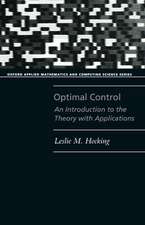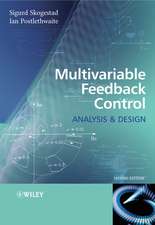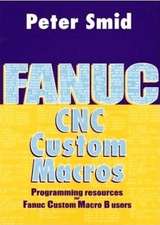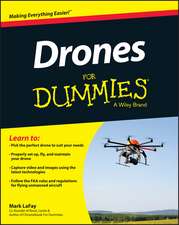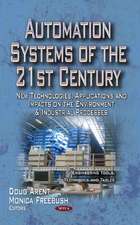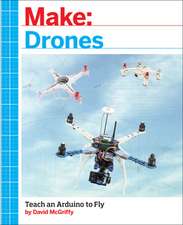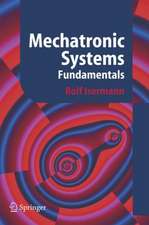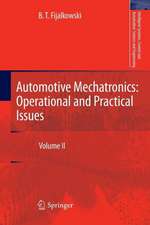ADEX Optimized Adaptive Controllers and Systems: From Research to Industrial Practice: Advances in Industrial Control
Autor Juan M. Martín-Sánchez, José Rodellaren Limba Engleză Hardback – 14 noi 2014
ADEX Optimized Adaptive Control Systems is divided into six parts, with exercises and real-time simulations provided for the reader as appropriate. The text begins with the conceptual and intuitive knowledge of the technology and derives the stability conditions to be verified by the driver block and the adaptive mechanism of the optimized adaptive controller to guaranty the desired control performance. The second and third parts present strategic considerations of predictive control and related adaptive systems necessary for the proper design of driver block and adaptive mechanism and thence their technical realization. The authors then proceed to detail the stability theory that supports predictive, adaptive predictive and optimized adaptive control methodologies. Benchmark applications of these methodologies (distillation column and pulp-factory bleaching plant) are treated next with a focus on practical implementation issues. The final part of the book describes ADEX platforms and illustrates their use in the design and implementation of optimized adaptive control systems to three different challenging-to-control industrial processes:
- waste-water treatment;
- sulfur recovery; and
- temperature control of superheated steam in coal-fired power generation.
ADEX Optimized Adaptive Control Systems provides practicing process control engineers with a multivariable optimal control solution which is adaptive and resistant to perturbation and the effects of noise. Its pedagogical features also facilitate its use as a teaching tool for formal university and Internet-based open-education-type graduate courses in practical optimal adaptive control and for self-study.
| Toate formatele și edițiile | Preț | Express |
|---|---|---|
| Paperback (1) | 898.75 lei 6-8 săpt. | |
| Springer International Publishing – 23 aug 2016 | 898.75 lei 6-8 săpt. | |
| Hardback (1) | 959.36 lei 6-8 săpt. | |
| Springer International Publishing – 14 noi 2014 | 959.36 lei 6-8 săpt. |
Din seria Advances in Industrial Control
- 15%
 Preț: 643.34 lei
Preț: 643.34 lei - 23%
 Preț: 582.63 lei
Preț: 582.63 lei - 18%
 Preț: 783.98 lei
Preț: 783.98 lei - 18%
 Preț: 947.35 lei
Preț: 947.35 lei - 20%
 Preț: 568.24 lei
Preț: 568.24 lei - 15%
 Preț: 643.16 lei
Preț: 643.16 lei - 18%
 Preț: 899.21 lei
Preț: 899.21 lei - 18%
 Preț: 891.33 lei
Preț: 891.33 lei - 18%
 Preț: 740.57 lei
Preț: 740.57 lei - 18%
 Preț: 961.23 lei
Preț: 961.23 lei - 18%
 Preț: 955.08 lei
Preț: 955.08 lei - 15%
 Preț: 645.28 lei
Preț: 645.28 lei - 15%
 Preț: 638.43 lei
Preț: 638.43 lei - 18%
 Preț: 901.11 lei
Preț: 901.11 lei - 18%
 Preț: 1410.94 lei
Preț: 1410.94 lei - 18%
 Preț: 728.91 lei
Preț: 728.91 lei - 20%
 Preț: 1003.77 lei
Preț: 1003.77 lei - 18%
 Preț: 947.35 lei
Preț: 947.35 lei - 15%
 Preț: 643.34 lei
Preț: 643.34 lei - 15%
 Preț: 654.30 lei
Preț: 654.30 lei - 18%
 Preț: 950.52 lei
Preț: 950.52 lei - 15%
 Preț: 644.30 lei
Preț: 644.30 lei - 18%
 Preț: 1393.09 lei
Preț: 1393.09 lei - 18%
 Preț: 950.21 lei
Preț: 950.21 lei - 18%
 Preț: 949.90 lei
Preț: 949.90 lei - 18%
 Preț: 949.42 lei
Preț: 949.42 lei - 18%
 Preț: 950.52 lei
Preț: 950.52 lei - 18%
 Preț: 1113.71 lei
Preț: 1113.71 lei - 15%
 Preț: 650.04 lei
Preț: 650.04 lei - 15%
 Preț: 644.95 lei
Preț: 644.95 lei - 18%
 Preț: 950.33 lei
Preț: 950.33 lei - 18%
 Preț: 948.61 lei
Preț: 948.61 lei - 18%
 Preț: 1112.60 lei
Preț: 1112.60 lei - 15%
 Preț: 644.63 lei
Preț: 644.63 lei - 18%
 Preț: 953.20 lei
Preț: 953.20 lei - 18%
 Preț: 945.62 lei
Preț: 945.62 lei - 15%
 Preț: 640.88 lei
Preț: 640.88 lei - 15%
 Preț: 640.88 lei
Preț: 640.88 lei - 20%
 Preț: 650.92 lei
Preț: 650.92 lei - 18%
 Preț: 1112.60 lei
Preț: 1112.60 lei - 20%
 Preț: 998.36 lei
Preț: 998.36 lei - 15%
 Preț: 643.34 lei
Preț: 643.34 lei - 18%
 Preț: 948.92 lei
Preț: 948.92 lei - 18%
 Preț: 1381.43 lei
Preț: 1381.43 lei - 15%
 Preț: 651.51 lei
Preț: 651.51 lei - 15%
 Preț: 647.08 lei
Preț: 647.08 lei - 20%
 Preț: 563.66 lei
Preț: 563.66 lei - 18%
 Preț: 998.03 lei
Preț: 998.03 lei - 18%
 Preț: 1225.79 lei
Preț: 1225.79 lei
Preț: 959.36 lei
Preț vechi: 1169.95 lei
-18% Nou
Puncte Express: 1439
Preț estimativ în valută:
183.59€ • 191.43$ • 152.58£
183.59€ • 191.43$ • 152.58£
Carte tipărită la comandă
Livrare economică 21 martie-04 aprilie
Preluare comenzi: 021 569.72.76
Specificații
ISBN-13: 9783319097930
ISBN-10: 3319097938
Pagini: 447
Ilustrații: XXXI, 447 p. 127 illus., 53 illus. in color.
Dimensiuni: 155 x 235 x 24 mm
Greutate: 0.84 kg
Ediția:2015
Editura: Springer International Publishing
Colecția Springer
Seria Advances in Industrial Control
Locul publicării:Cham, Switzerland
ISBN-10: 3319097938
Pagini: 447
Ilustrații: XXXI, 447 p. 127 illus., 53 illus. in color.
Dimensiuni: 155 x 235 x 24 mm
Greutate: 0.84 kg
Ediția:2015
Editura: Springer International Publishing
Colecția Springer
Seria Advances in Industrial Control
Locul publicării:Cham, Switzerland
Public țintă
Professional/practitionerCuprins
Introduction and Fundamentals of Optimized Adaptive Controllers and Systems.- Introduction to Optimized Adaptive Controllers and Systems.- Scenarios, Notation and Stability Conditions.- Exercises for Part I.- Design of the Driver Block: Basic and Extended Predictive Control Strategies.- Basic Strategy of Predictive Control.- Extended Strategy of Predictive Control.- Exercises for Part II.- Design of the Adaptation Mechanism: Synthesis of the Adaptive System.- Analysis and Synthesis of the Adaptive System in the Real Case.- Exercises for Part III.- Stability Theory of Adaptive Predictive Control.- Stability Theory.- Exercises for Part IV.- Benchmark Applications of Predictive, Adaptive Predictive, and Optimized Adaptive Control.- Multivariable Control of a Distillation Column.- Control of a Bleach Plant in a Pulp Factory.- Technological realization of ADEX Optimized Adaptive Control Systems.- A Software Platform for Adaptive Predictive Expert Control Applications.- Application of ADEX COP v.1 to the Biological Process of a Wastewater Treatment Plant.- ADEX Optimized Adaptive Control System for the Sulfur Recovery Process at Pemex Cadereyta Refinery.- ADEX Optimized Adaptive Control System for Superheated Steam Temperature in a Coal-Fired Power Plant.- Appendices: Some Basic Concepts of System Analysis; Other Predictive Models and Performance Indices; Input/Output Properties of Stable Linear Processes; ADEX COP Manuals.
Notă biografică
Juan M. Martín-Sánchez obtained the title of Industrial Engineer in 1970, and Doctor Industrial Engineer in 1974, both from the Polytechnic University of Catalunya (UPC). From 1971 to 1976, his research activities were continued at Grenoble and Toulouse Universities in France, at the Massachusetts Institute of Technology and the Charles Stark Draper Laboratory in the United States, and the University of Alberta in Canada. In 1976, he filed the first patent for predictive and adaptive predictive control, and subsequently he obtained 3 additional international patents for both control methodologies. In 1986, he founded the company SCAP Europa which went on to carry out more than 150 industrial applications of the adaptive predictive control methodology between 1986 and 1998. In 1999 Martín-Sánchez founded the company Adaptive Predictive Expert Control ADEX S.L., of which he is currently the President. This company develops optimization projects based on adaptive predictive expert control in industrial areas such as chemical, petrochemical, energy, cement, metallurgy, naval, aerospace, environment and climate control. He has authored more than 100 publications and three books on adaptive predictive control, has given plenary sessions at important international conferences, seminars and congresses, and has been a member of the editorial board of the International Journal of Control. He has been a professor at the UPC, the University of Alberta and the Universidad Politécnica de Madrid. In addition to his role as President at ADEX, S.L., he is also currently a full professor at the Universidad Nacional de Educación a Distancia (UNED) in Madrid (Open University of Spain). Between January 2004 and January 2009, he has been President of the IEEE Joint Spanish Chapter of the Industrial Applications Society (IAS) and the Control Systems Society (CCS). In 2005 and 2007 under his Presidency, the Chapter organized two Seminars of Advanced Industrial ControlApplications (SAICA). These events took place with great success in the “Fundación Gómez-Pardo” in Madrid. In January 2009, Dr. Martín-Sánchez was elevated to the grade of IEEE Fellow for his “Contributions to the Adaptive Predictive Control methodologies”. During 2010 and 2011 was a Distinguished Lecturer of IEEE and, at present, a Prominent Lecturer. As Guest Editor, he prepared a Special Issue on Industrial Optimized Adaptive Control of the International Journal of Adaptive Control and Signal Processing that was published in October 2012.
Textul de pe ultima copertă
This book is a didactic explanation of the developments of predictive, adaptive predictive and optimized adaptive control, including the latest methodology of adaptive predictive expert (ADEX) control, and their practical applications. It is focused on the stability perspective, used in the introduction of these methodologies, and is divided into six parts, with exercises and real-time simulations provided for the reader as appropriate.
ADEX Optimized Adaptive Controllers and Systems begins with the conceptual and intuitive knowledge of the technology and derives the stability conditions to be verified by the driver block and the adaptive mechanism of the optimized adaptive controller to guarantee achievement of desired control performance. The second and third parts are centered on the design of the driver block and adaptive mechanism, which verify these stability conditions. The authors then proceed to detail the stability theory that supports predictive, adaptive predictive and optimized adaptive control methodologies. Benchmark applications of these methodologies (distillation column, pulp-factory bleaching plant and flexible structures) are treated next with a focus on practical implementation issues. The final part of the book describes ADEX platforms, and illustrates their use in the design and implementation of optimized adaptive control systems in three different challenging-to-control industrial processes:
· waste-water treatment;
· sulfur recovery; and
· temperature control of superheated steam in coal-fired power generation. The presentation is completed by a number of appendices containing technical background associated with the main text, including a manual for the first ADEX COP platform developed to exploit the capabilities of adaptive predictive control in real plants.
ADEX Optimized Adaptive Controllers and Systems provides practicing process control engineers with a multivariable optimized control solution which is adaptive and resistant to changes in process dynamics, perturbations and the effects of noise. Its pedagogical features also facilitate its use as a teaching tool for formal university and Internet-based open-education-type graduate courses in practical optimized adaptive control and for self-study.
Advances in Industrial Control aims to report and encourage the transfer of technology in control engineering. The rapid development of control technology has an impact on all areas of the control discipline. The series offers an opportunity for researchers to present an extended exposition of new work in all aspects of industrial control.
ADEX Optimized Adaptive Controllers and Systems begins with the conceptual and intuitive knowledge of the technology and derives the stability conditions to be verified by the driver block and the adaptive mechanism of the optimized adaptive controller to guarantee achievement of desired control performance. The second and third parts are centered on the design of the driver block and adaptive mechanism, which verify these stability conditions. The authors then proceed to detail the stability theory that supports predictive, adaptive predictive and optimized adaptive control methodologies. Benchmark applications of these methodologies (distillation column, pulp-factory bleaching plant and flexible structures) are treated next with a focus on practical implementation issues. The final part of the book describes ADEX platforms, and illustrates their use in the design and implementation of optimized adaptive control systems in three different challenging-to-control industrial processes:
· waste-water treatment;
· sulfur recovery; and
· temperature control of superheated steam in coal-fired power generation. The presentation is completed by a number of appendices containing technical background associated with the main text, including a manual for the first ADEX COP platform developed to exploit the capabilities of adaptive predictive control in real plants.
ADEX Optimized Adaptive Controllers and Systems provides practicing process control engineers with a multivariable optimized control solution which is adaptive and resistant to changes in process dynamics, perturbations and the effects of noise. Its pedagogical features also facilitate its use as a teaching tool for formal university and Internet-based open-education-type graduate courses in practical optimized adaptive control and for self-study.
Advances in Industrial Control aims to report and encourage the transfer of technology in control engineering. The rapid development of control technology has an impact on all areas of the control discipline. The series offers an opportunity for researchers to present an extended exposition of new work in all aspects of industrial control.
Caracteristici
Provides the reader with a complete set of proven theoretical concepts and practical tools for the development of industrial optimized adaptive control systems Demonstrations on regularly-used benchmark applications allow comparison with other forms of control under consideration Gives the reader confidence in the technology discussed via individual sections on conceptual knowledge, technical realization, and practical experimentation Includes supplementary material: sn.pub/extras

